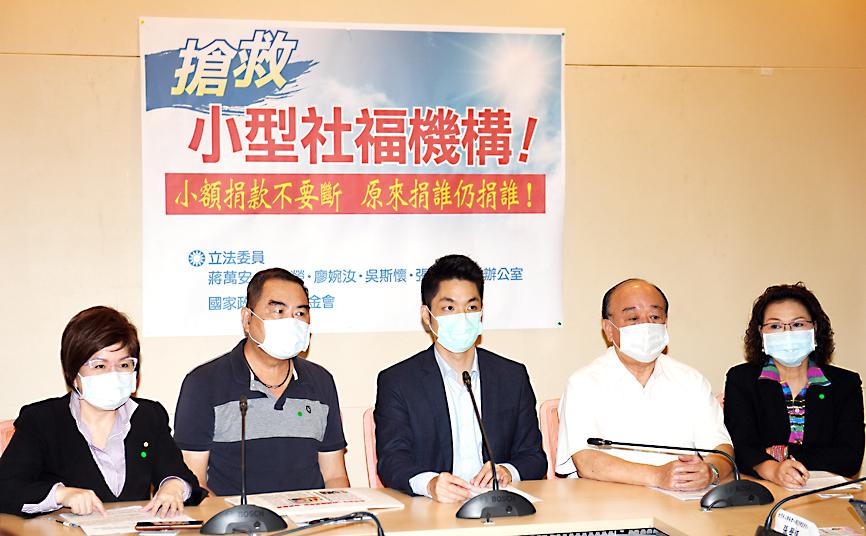Chinese Nationalist Party (KMT) legislators yesterday encouraged the public not to stop donating to charities, as even small sums could save groups facing difficulty raising funds amid the COVID-19 pandemic.
“It is not an issue of being charitable,” KMT Legislator Wu Sz-huai (吳斯懷) said. “Whether these organizations survive can spell life or death for the disadvantaged people they care for.”
The pandemic is also affecting fundraising for social welfare and eating into funds for standing outreach, said Chang Hsueh-heng (張學恆), founder of a watchdog for the rights of those with mental and physical disabilities.

Photo: CNA
The government should give a six-month subsidy, help people willing to work for certain organizations and give subsidies to volunteers, Chang said.
Council of Social Welfare, Taiwan secretary-general Chen Fen-ling (陳芬苓) said that her group has helped more than 3,000 social welfare groups in Taiwan, many of whom play an important role in helping the disadvantaged.
“If these groups fail to weather the pandemic, the government will find itself shouldering a much heavier social welfare burden,” Chen said.
Social welfare organizations not receiving government subsidies can get overlooked, Taiwan Hsin Chu Lun Association secretary-general Chen Yu-hsin (陳裕昕) said, adding that most of them do not meet the criteria for subsidies.
The groups are seeing a 30 to 40 percent decline in donations and sales income, which is starting to hurt them, Chen Yu-hsin said.
KMT Legislator Chiang Wan-an (蔣萬安) urged the government to look into the issue and offer help.
The government has overlooked social welfare groups — which should be considered disadvantaged groups — and is too focused on bailing out other businesses, KMT Legislator Chang Yu-mei (張育美) said.
Separately, the KMT held a conference at its headquarters in Taipei to urge the government to offer greater help to workers.
KMT Culture and Communications Committee chair Alicia Wang (王育敏) said that government subsidies are restrictive, with only certain sectors of workers benefitting, while the majority of workers go without subsidies.
The Ministry of Labor is offering loans for employee salaries to businesses affected by the pandemic, it said in a press release yesterday, adding that severely affected businesses could receive 40 percent of employees’ monthly salaries, up to NT$20,000.
These measures are meant to help businesses get back to work after the pandemic passes, without having to hire any new employees, it said.
There are subsidies for salaries, vocational training costs, job losses and labor insurance, as well as temporary suspensions of payments and interest on start-up loans for businesses, the ministry added.
Workers in need can obtain up to NT$100,000 in loans, it said, adding that the Ministry of Health and Welfare is also offering subsidies for those in financial difficulty.
Subsidy thresholds must be established to provide limited funding to those who truly needed it, the Ministry of Labor said, adding that the government is providing all the help it can to industries affected by the pandemic.

‘DENIAL DEFENSE’: The US would increase its military presence with uncrewed ships, and submarines, while boosting defense in the Indo-Pacific, a Pete Hegseth memo said The US is reorienting its military strategy to focus primarily on deterring a potential Chinese invasion of Taiwan, a memo signed by US Secretary of Defense Pete Hegseth showed. The memo also called on Taiwan to increase its defense spending. The document, known as the “Interim National Defense Strategic Guidance,” was distributed this month and detailed the national defense plans of US President Donald Trump’s administration, an article in the Washington Post said on Saturday. It outlines how the US can prepare for a potential war with China and defend itself from threats in the “near abroad,” including Greenland and the Panama

A wild live dugong was found in Taiwan for the first time in 88 years, after it was accidentally caught by a fisher’s net on Tuesday in Yilan County’s Fenniaolin (粉鳥林). This is the first sighting of the species in Taiwan since 1937, having already been considered “extinct” in the country and considered as “vulnerable” by the International Union for Conservation of Nature. A fisher surnamed Chen (陳) went to Fenniaolin to collect the fish in his netting, but instead caught a 3m long, 500kg dugong. The fisher released the animal back into the wild, not realizing it was an endangered species at

The Chinese Nationalist Party (KMT) is maintaining close ties with Beijing, the Democratic Progressive Party (DPP) said yesterday, hours after a new round of Chinese military drills in the Taiwan Strait began. Political parties in a democracy have a responsibility to be loyal to the nation and defend its sovereignty, DPP spokesman Justin Wu (吳崢) told a news conference in Taipei. His comments came hours after Beijing announced via Chinese state media that the Chinese People’s Liberation Army’s Eastern Theater Command was holding large-scale drills simulating a multi-pronged attack on Taiwan. Contrary to the KMT’s claims that it is staunchly anti-communist, KMT Deputy

The High Prosecutors’ Office yesterday withdrew an appeal against the acquittal of a former bank manager 22 years after his death, marking Taiwan’s first instance of prosecutors rendering posthumous justice to a wrongfully convicted defendant. Chu Ching-en (諸慶恩) — formerly a manager at the Taipei branch of BNP Paribas — was in 1999 accused by Weng Mao-chung (翁茂鍾), then-president of Chia Her Industrial Co, of forging a request for a fixed deposit of US$10 million by I-Hwa Industrial Co, a subsidiary of Chia Her, which was used as collateral. Chu was ruled not guilty in the first trial, but was found guilty